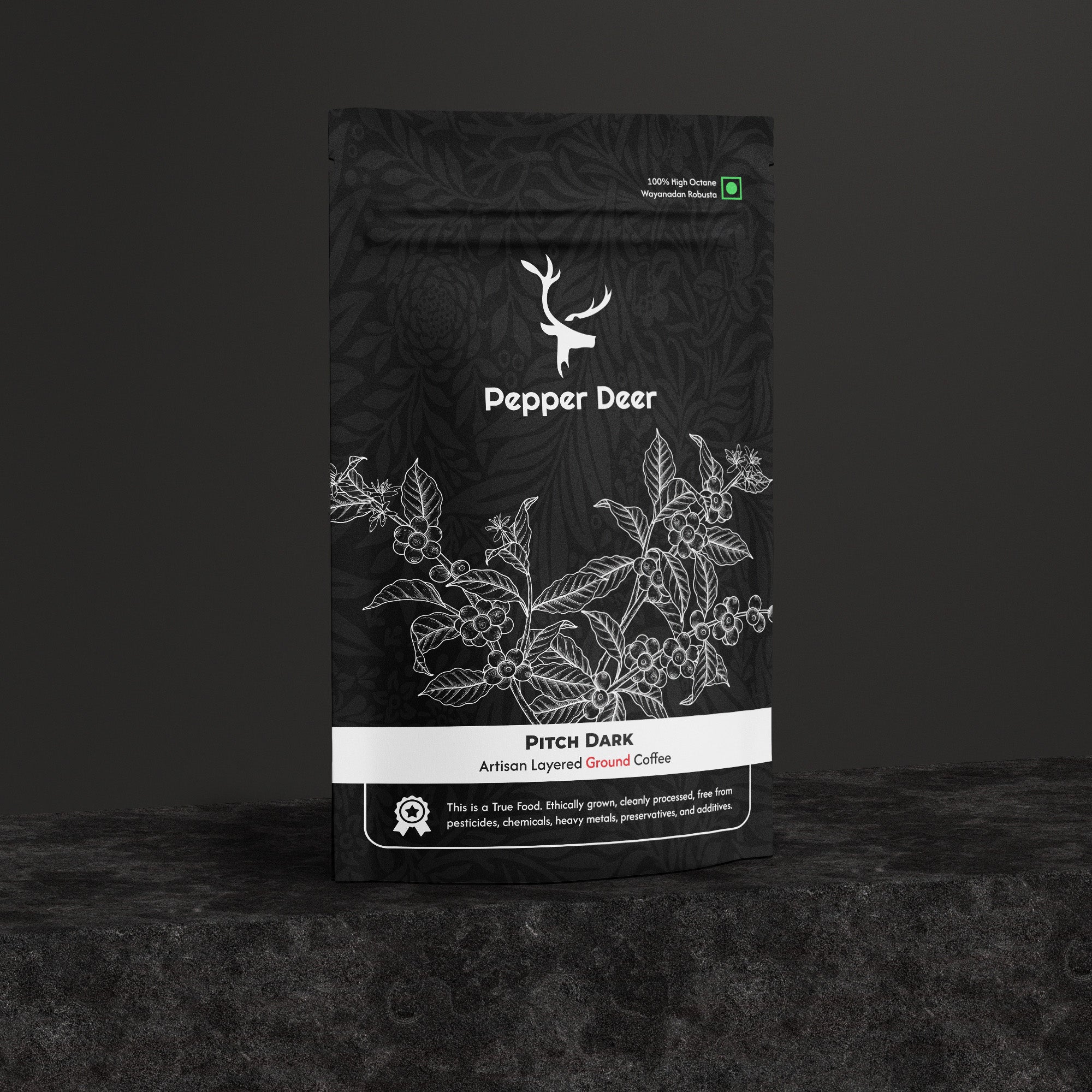Understanding sweeteners and their impact
Sugar is confusing for many of us. Regular sugar, brown sugar, honey, dates, artificial sweeteners - all claiming to be the healthier option. One says natural, the other says zero calories. And in the middle of it all, we’re just trying to figure out what’s actually good for consumption. In this blog, let’s break it down and get a clear answer on what works best for you.
Get ready to clear all your doubts once and for all.
Quick Reference: Sweetener Comparison Table

Traditional Sugars
First, let's look at the two traditional sugars.
| White Sugar (Table Sugar) | Brown Sugar |
| Pure sweetness, no nutrients | Reality check: Just white sugar + molasses |
| Best for baking, where texture matters | Minimal mineral content |
| Quick blood sugar spike | Don't be fooled, it's not considerably healthier than white sugar |
White and brown sugar may look different, but nutritionally, they’re nearly identical. Brown sugar goes through slightly less processing and retains a bit of molasses, but don’t mistake that for healthy. Both offer empty calories with rapid blood sugar spikes and no real health benefits. If you're trying to eat cleaner, these are the first ones to rethink.
Natural Alternatives to Sugar
Now, let's focus on the natural alternatives, their benefits, and limitations.
1. Honey
Honey rarely spoils; archaeologists have found 3,000-year-old honey still perfectly edible in Egyptian tombs. Its antimicrobial properties make it one of the few foods that don't require preservatives or refrigeration. Always opt for raw, unfiltered versions.
| Pros | Cons |
| Natural antibacterial properties | Still spikes blood sugar |
| Contains antioxidants | High calorie content |
| Better than table sugar when substituting | Benefits lost in high-heat cooking |
2. Dates
Whole Dates contain more potassium by weight than bananas and have been cultivated for over 8,000 years. A single date provides quick energy with approximately 23 calories and 5g of natural carbohydrates.
.
| Pros | Cons |
| High in fiber (7-8%) | Concentrated calories |
| Rich in minerals | Can spike blood sugar if over-consumed |
| Provides sustained energy | Not suitable for low-carb diets |
3. Coconut Sugar
Made from the evaporated sap of coconut palm flowers; contains inulin, a prebiotic fiber, and small amounts of minerals. Good for baking and hot beverages, where subtle caramel notes work well. Can clump due to moisture, thus some brands add anti-caking agents like silicon dioxide.
| Pros | Cons |
| Lower Glycemic Index | Still high in calories |
| Contains minerals | Expensive |
| Has prebiotic fiber | May clump due to moisture |
4. Maple Syrup
Boiled down sap from sugar maple trees, Pure maple syrup requires 40 gallons of sap to produce just one gallon of syrup. It contains 67 different antioxidant compounds, with some dark grades providing more antioxidants than a serving of broccoli.
| Pros | Cons |
| 67 different antioxidants | Expensive |
| Rich in manganese | High calorie content |
| Less fructose than honey | Quality varies widely |
5. Agave Nectar
Extracted from the blue agave plant and heavily processed to concentrate its sweet, low-GI syrup form. Agave nectar contains up to 90% fructose, higher than both HFCS (55%) and regular sugar (50%). While this creates a lower glycemic response, it's metabolized entirely by the liver rather than the digestive system. Again, it’s heavily processed, so it just might not be the health hero it pretends to be.
| Pros | Cons |
| Very low Glycemic Index | Extremely high fructose |
| 1.5 times sweeter than sugar | Highly processed |
| Good for cold dishes | May stress the liver |
Within natural alternatives, there are two popular zero-calorie options as well. Let’s look at what they bring to the table and what they don’t.
6. Stevia Sweetener
Stevia leaves naturally contain steviol glycosides that are 250-300 times sweeter than sugar. Unlike artificial sweeteners, stevia may actually improve insulin sensitivity rather than disrupt it. However, commercial Stevia Sweeteners are often diluted with fillers like erythritol, dextrose, or maltodextrin, so the "natural" could be only in the name.
| Pros | Cons |
| Zero calories | Bitter aftertaste |
| Natural origin | Limited long-term studies |
| May help blood pressure | Doesn't work for all recipes |
7. Monk Fruit
Monk fruit's sweetness comes from antioxidant compounds called mogrosides, which are 300 times sweeter than sugar. Buddhist monks first cultivated these fruits in the 13th century, giving the fruit its common name. Often blended with erythritol or bulking agents to balance sweetness, beware of added polyols or preservatives in commercial blends.
| Pros | Cons |
| Zero calories | Very expensive |
| No known side effects | Limited availability |
| Good for diabetics | Taste takes getting used to |
So those are the 7 main alternatives to traditional sugar, each with its own pros and cons. But which one actually suits you best? That depends on your goals, your health needs, and how you plan to use it. Let’s break that down next.
Who Should Use What?
1. For Diabetics
The goal is steady blood sugar. Choose sweeteners with low glycemic impact and minimal processing.
| ✓ Best Choices | ✗ Avoid |
| Stevia | Regular sugar |
| Monk Fruit | Agave nectar |
| Small amounts of dates | Coconut sugar |
2. For Athletes
You need fast energy, not fake energy. Natural sugars planned around workouts can fuel performance, just don’t overdo it.
| ✓ Best Choices | ✗ Avoid |
| Dates (before exercise) | Artificial sweeteners |
| Honey (during exercise) | Agave nectar |
| Maple syrup (for energy) | Refined white sugar |
3. For Weight Management
Cutting sugar is about control, not just calories. Stick to clean, low-GI options and avoid hidden sugars in everyday foods.
| ✓ Best Choices | ✗ Avoid |
| Stevia Sweetener | Any sugars in large quantities |
| Monk Fruit Sweetener | Hidden sugars in processed foods |
| Small portions of dates | High quantities of carbohydrates. |
The 5 Golden Rules
1. No sweetener is "healthy." Some are just less problematic.
2. Natural doesn't always mean better.
3. Quantity matters more than type.
4. Consider your specific needs (health, cooking, cost).
5. Always check for hidden sugars in processed foods.
Smart Swaps
These simple swaps can help reduce sugar intake while keeping your meals healthier and lower in calories:

The Truth About Claims
Understanding the truth behind these claims helps you see past the marketing, so you can make choices that are truly better for your health.

Some Frequently Asked Questions
Q: Are natural sweeteners like honey really better than regular sugar?
While honey contains some beneficial compounds like antioxidants, it still raises blood sugar levels similarly to regular sugar. The benefits come when you use it as a replacement (using less) rather than an addition.
Q: Do zero-calorie sweeteners cause weight gain?
Research is mixed. Some studies suggest artificial sweeteners may alter gut bacteria or increase cravings, but others show they can help with weight management when used to replace sugar. The key is moderation.
Q: Can diabetics have any sugar at all?
Most diabetics can include small amounts of sugar within their overall carbohydrate budget, preferably from natural, whole food sources like fruit. Individual tolerance varies, so blood glucose monitoring and medical guidance are essential.
Q: What's the best sweetener for baking?
Regular sugar provides the best texture and browning properties. For health-conscious baking, a 50/50 mix of sugar and date paste or mashed bananas can work well for moisture-heavy recipes like muffins and quick breads.
Making Smarter Sweet Choices
The sweetener landscape doesn't need to be confusing. Remember that no sweetener is a health food; the goal is finding options that fit your specific needs while minimizing downsides.
Start by tracking your current sugar intake for a week. You might be surprised how quickly those teaspoons add up. Then, experiment with reducing amounts gradually and trying different alternatives to find what works for your taste buds and health goals.
If this guide helped you, join our newsletter for more nutrition insights and healthy living tips! Let us know what form of sugar you want the most, and we'll provide the natural, fresh version of it to you soon.


